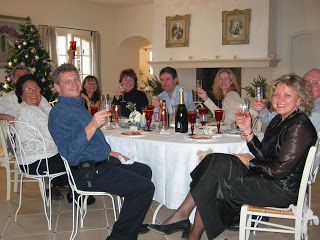
As I write this week’s post, 2011 is about to roll into 2012 and I am reflecting on all the wonderful times I have had around the table this year and in years past. Adam Gopnik’s book does this to you. I highly recommend “The Table Comes First: Family, France, and the Meaning of Food.” I might add that I “listened” to much of the book, which I particularly enjoyed because Mr. Gopnik narrates the audio book himself. Until you can get your hands on the book, I leave you with some of my favorite quotes from “The Table Comes First” at the end of this post.
Adam Gopnik, who gave us “From Paris to the Moon” and regularly writes for The New Yorker, has just written a new book, “The Table Comes First: Family, France, and the Meaning of Food.” It is a jewel of a book about two of my favorite topics—food and France—and the pivotal role that sitting ’round the table with family, friends, lovers and even our enemies plays in our lives.
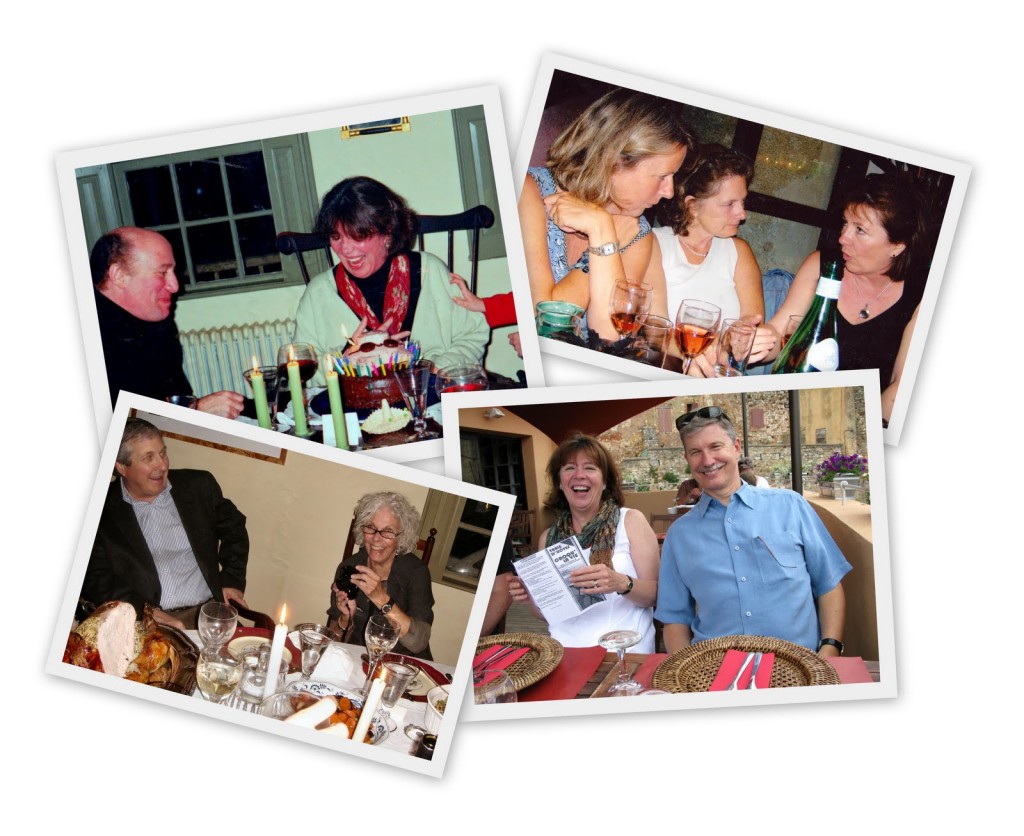
Although the book is in large part about the food on the table, it really centers on what happens around the table.” The table, according to Mr. Gopnik, is the scene of celebration and solemnity, negotiations and debate, beginnings and endings. Mr. Gopnik’s story starts in 18th century Paris, where modern tastes and restaurants began—and where he and his family lived for years—and takes us on a journey through other parts of the world and back to Paris. For me, he took me through scenes of my own life, so much of it spent at the table, including many tables in France.
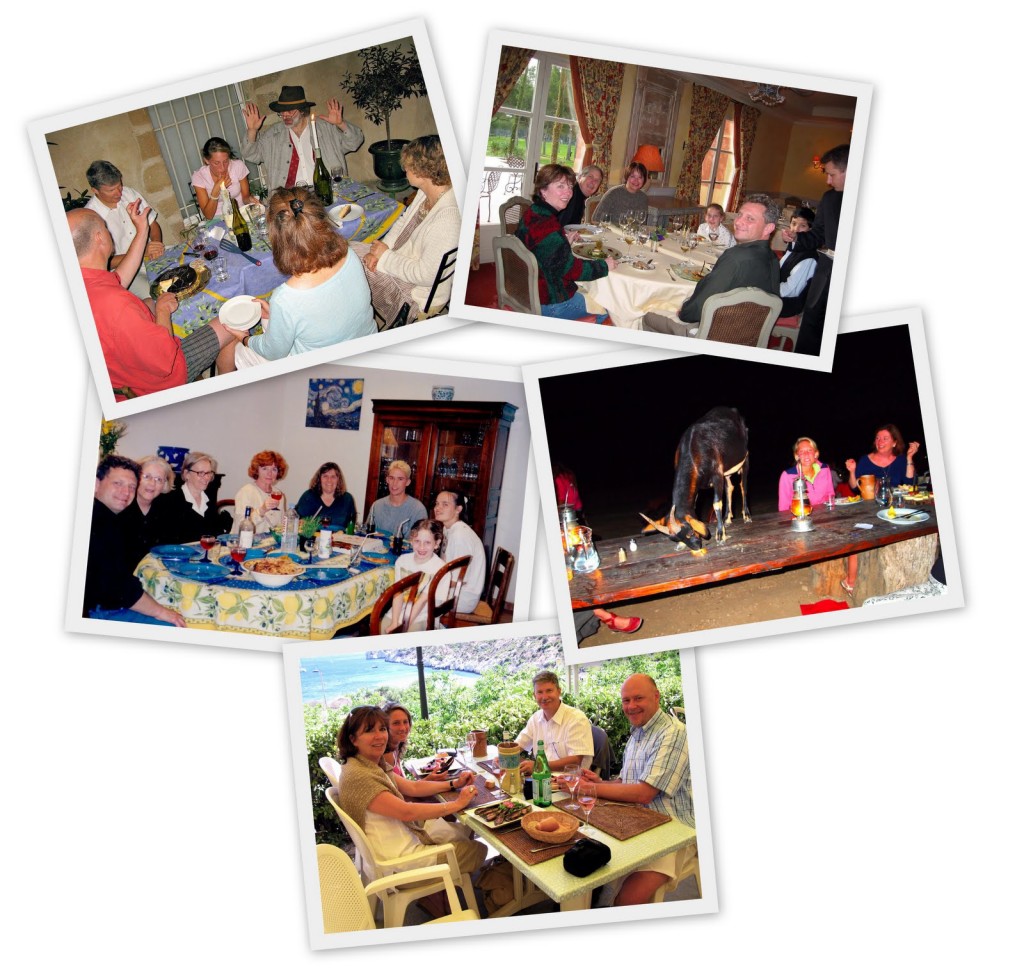
The book was an ambitious project. To cover so much—the meaning of food, the pleasure of food, the politics of food, the current status of French food, the origin of the word “restaurant,” history of restaurants and recipe books, and the importance of “the table” while weaving in tasty morsels about French wine, Robert Parker’s very American rating system of French wines, food writers, philosophers, new food movements, and even a few recipes—would be daunting to anyone but Mr. Gopnik, who pulled it off brilliantly. The end product is trademark Gopnik: simultaneously erudite and seductive.
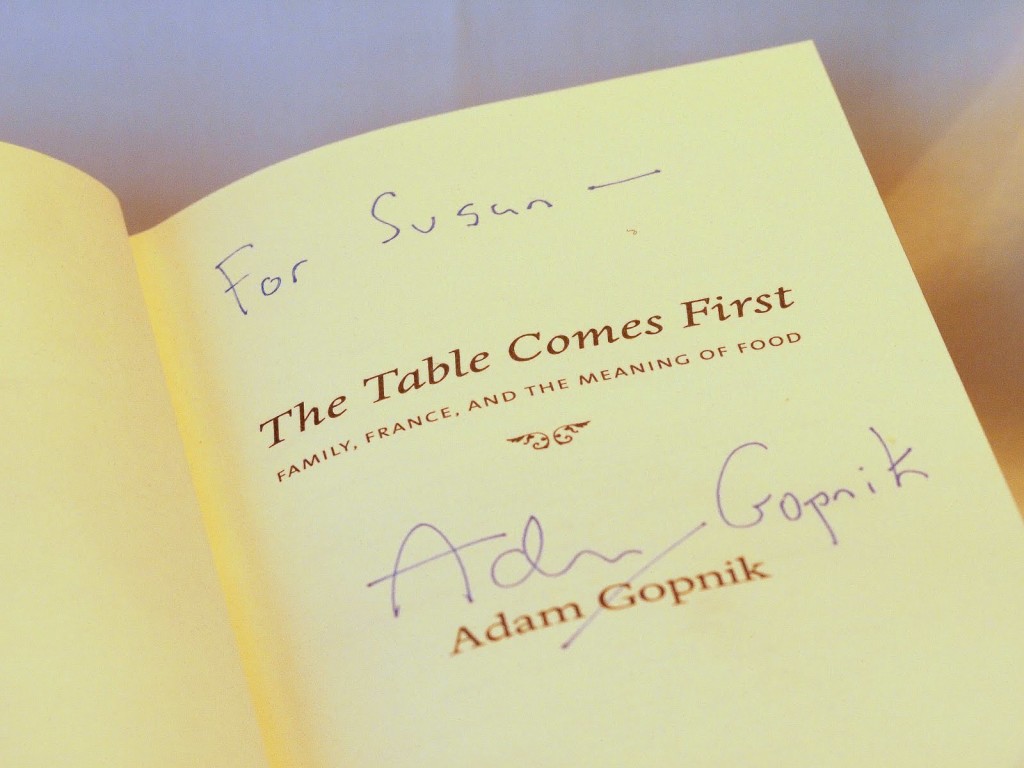
I had the pleasure of listening to Mr. Gopnik talk about his new book a few weeks ago at a very small gathering in The Music Hall Loft in Portsmouth, New Hampshire. Towny and I, accompanied by friends and fellow Francophiles George and Lee-Ann McQuilken, began the evening, naturally, at the table, in a nearby restaurant, and ended it with a promise to meet for dinner again soon.
Mr. Gopnik’s talk was filled with the same passion for food and for France that is so evident throughout his book. Having written about food for 25 years and having lived in Paris for many of those years, Mr. Gopnik explained that the book was the natural outcome of material he had collected and questions he had entertained for years. His biggest struggle was how to organize it all until he came across a letter written by a young man awaiting execution by the Nazis in 1942. This man, who took the name Jacques Decour, wrote to his parents in the last hours of his life about, of all things, his favorite meals! And it was a menu, left in his apartment from a small inn near Versailles, that he asked his parents to make sure that his girlfriend’s parents received.
“Why do we care so much about food?” Mr. Gopnik muses…”Food represented for [Decour] the continuity of living, and what gave form to life.
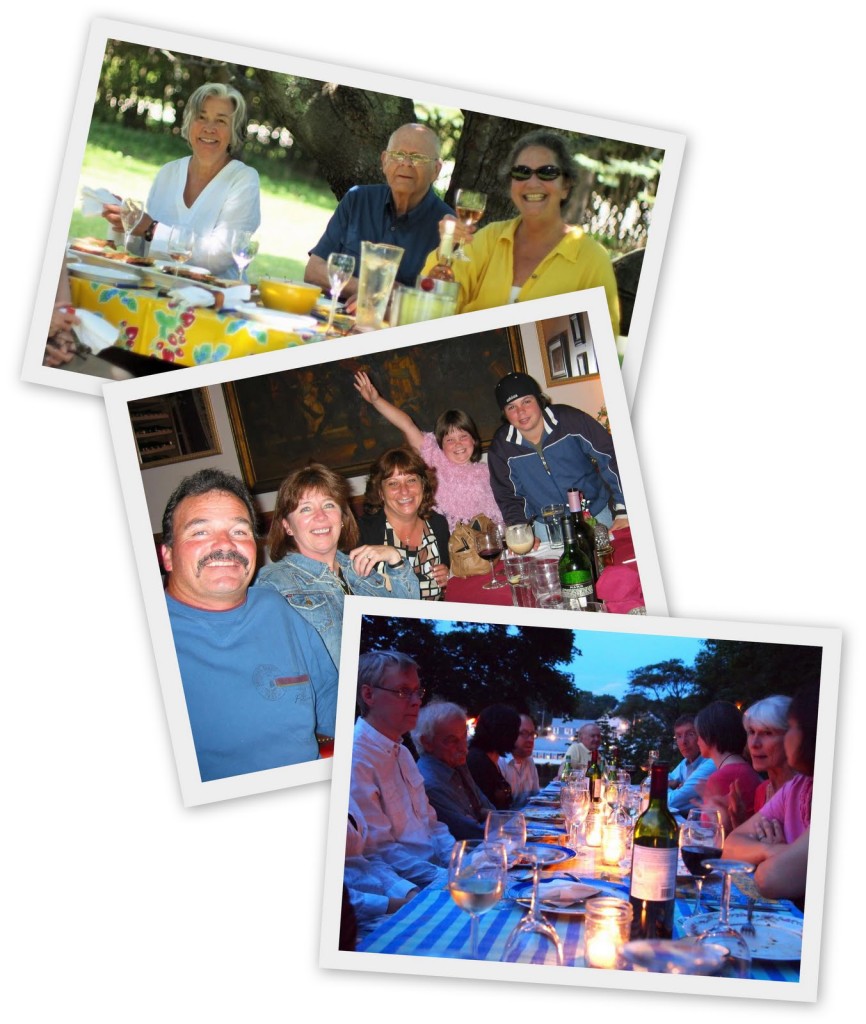
Certainly, there are exceptions—there are people who report that they eat to live and with no particular interest of what goes on around the table. I don’t know any of these people but I am told they exist, which prompted me to ask Mr. Gopnik if he thought some hands-on learning about the importance of food and the table was necessary in order to “care so much about food”.
For the French, I think, the importance of food and the table is instilled early on. In striking contrast to the average elementary school in the States where tasteless food is slopped on a tray, expected to be eaten in twelve minutes, and often in requisite silence, the average elementary school in France serves a tasty meal and encourages conversation.
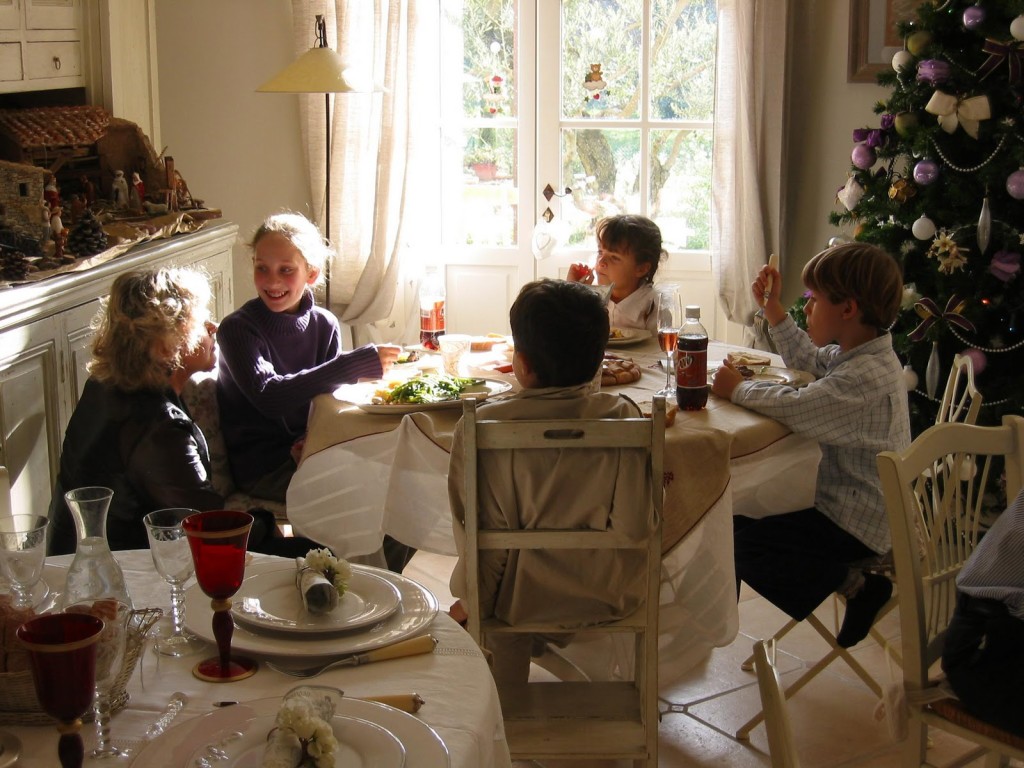
When we lived in France, our daughter and her classmates at the local elementary school in Lourmarin had nearly two hours for her three-course lunch (menus posted every week), students sat around a table, and they talked…and teachers, who ate with the students, drank wine! (Then they played!)
(People who know me know that the typical American school meal and lunchroom experience infuriates me…and don’t get me started on parents who hand their kids a video game to entertain themselves at the family table! I am worried that we are producing generations of children who not only don’t appreciate good food but don’t know how to hold a fork or carry on a conversation! Code words, like NTT won’t be necessary, Mark, because no one’s talking! But, this is a subject for another post!)
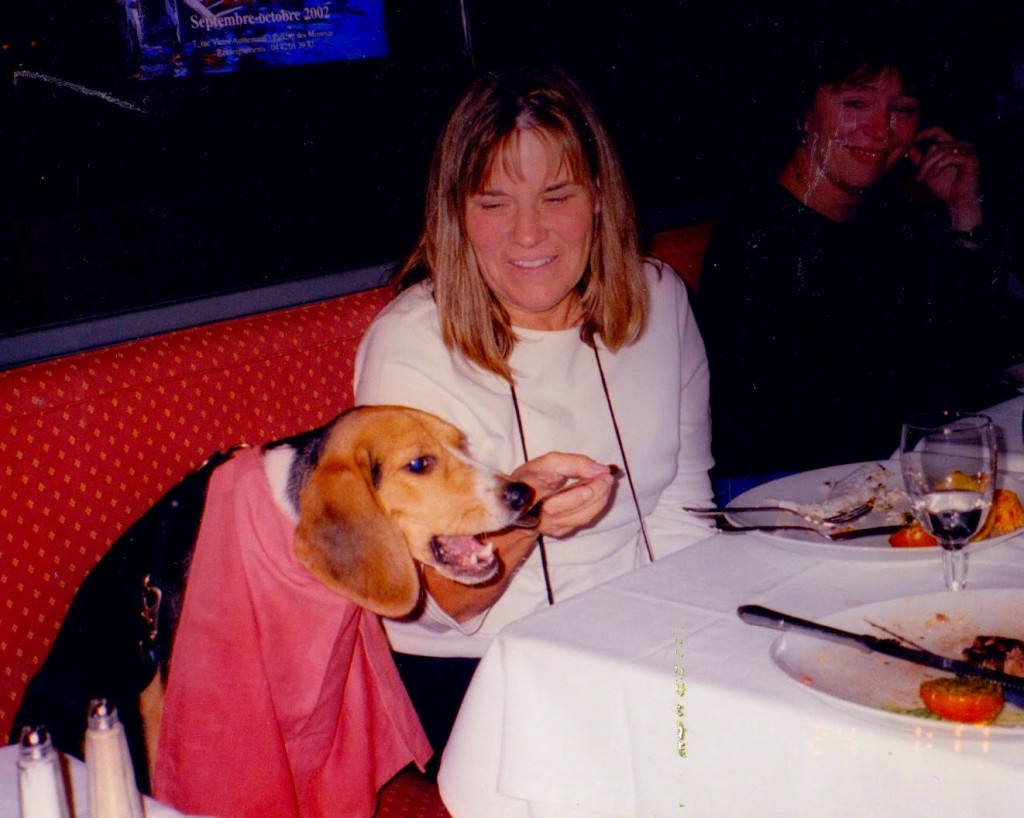
In his book, Mr. Gopnik writes that, for the French, caring about food is “a sign of civilization.” In his response to my question, he agreed that what happens around the table early on is important, but pointed that there is a movement in France now (I assume he is referring to the Le Fooding, which he writes about in his book) for whom, in my words, too much time is spent languishing over food at the French table. One could argue, though, that the very fact that there is a movement about food—even if it strives to change France’s relationship to food and the table—underscores importance of food and the table in that culture.
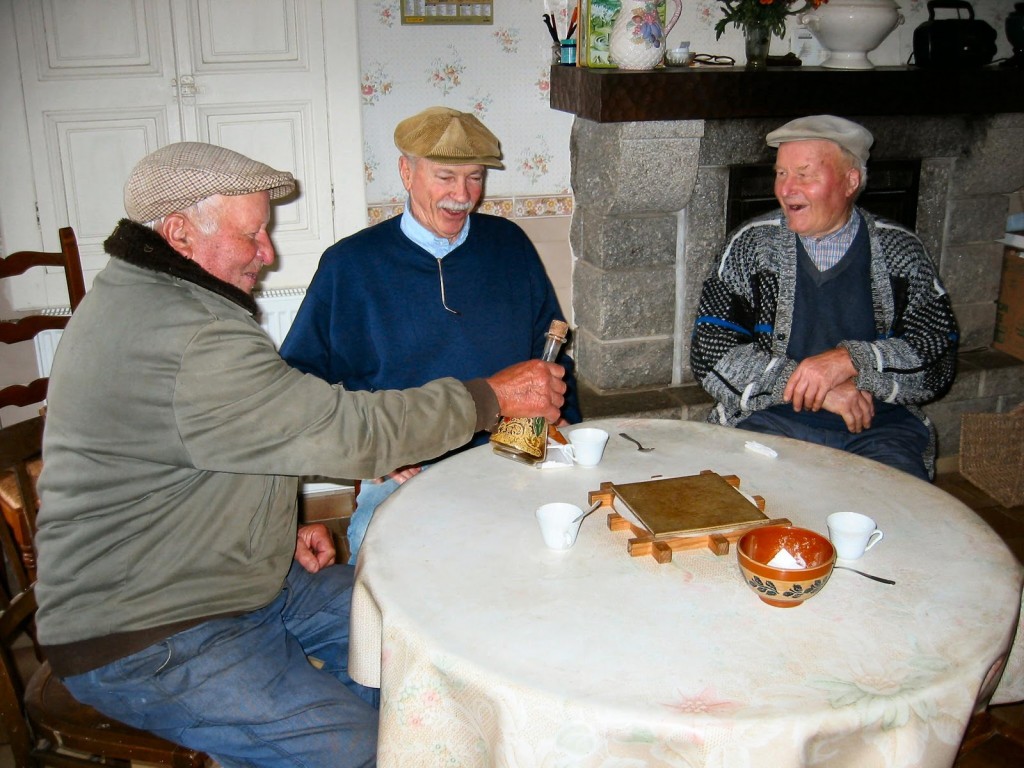
The book will surely provide fodder for conversation around your table and, perhaps, as it did for me, make you think about your own relationship with food and the table.
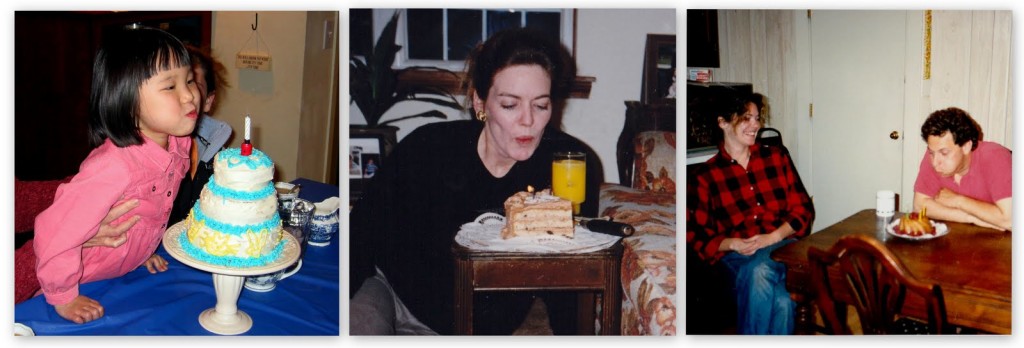
Although I grew up in the era of TV dinners and TV trays, what I remember most about food in my house are the dinners around the table. Often it was just my brother and me, seated at our relatively large dining room table, because my mother would wait for my father who frequently worked late. My mother was—and still is—a wonderful cook but she happily (I think) made food that pleased her kids (for which we were immensely grateful) and saved her diverse repertoire of culinary skills for company. On those special occasions, we were treated to (or at least exposed to) lavish feasts of Armenian food, Mexican food, lots of barbequed food, and beautiful roasts. Desserts were her show stoppers. My father also enjoyed cooking—strange things, I thought at the time, like beerocks—but also breads and wonderful sticky buns. I suppose that I recognized how much a part of him these few signature dishes were because, one time when I was particularly mad at him, I told him that I hated his sticky buns.
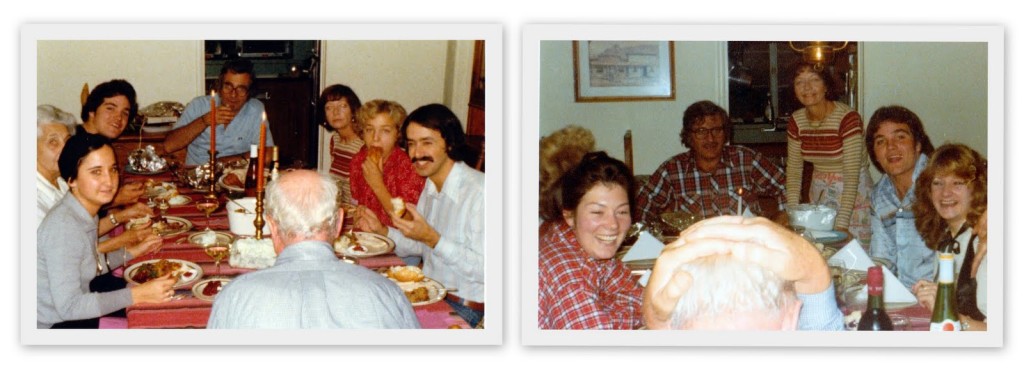
There was indeed a lot that went on around our table, not always pleasant but usually fun and guaranteedto be filled with laughs when my beloved grandparents were there. They are gone now and I had to smile when I read Mr. Gopnik’s homage to loved ones we wish were still coming to dinner.
I always get impatient, despairing, when people say that the dead are alive in spirit, or are alive in us. They aren’t. The best I can do is to think that they are sleeping off their jet lag in the next bedroom, like furious children giving in at last, but they don’t want to be in that room. They’re angry as hell, because they want to be sitting right here at this table with the rest of us and the best we can do is to have the grace to be furious on their behalf. (p. 286)
I’ll make Old Fashioneds for you, MG and Grampi, and for all my family and friends I wish could join us for dinner tonight, our first Sunday dinner in 2012!
We will be serving Mr. Gopnik’s lamb—it is excellent and do add the harissa and Towny recommends a little grated lemon rind, too—with couscous, green beans, a beet salad with chêvre, and homemade whole wheat Parker House rolls. And, oh yes, the dessert will be a pear cake with eucalyptus honey and ricotta whipped cream (ask David at Cocoa &Lavender). We will start with oysters and a lovely champagne. 7:00 p.m., at the house.
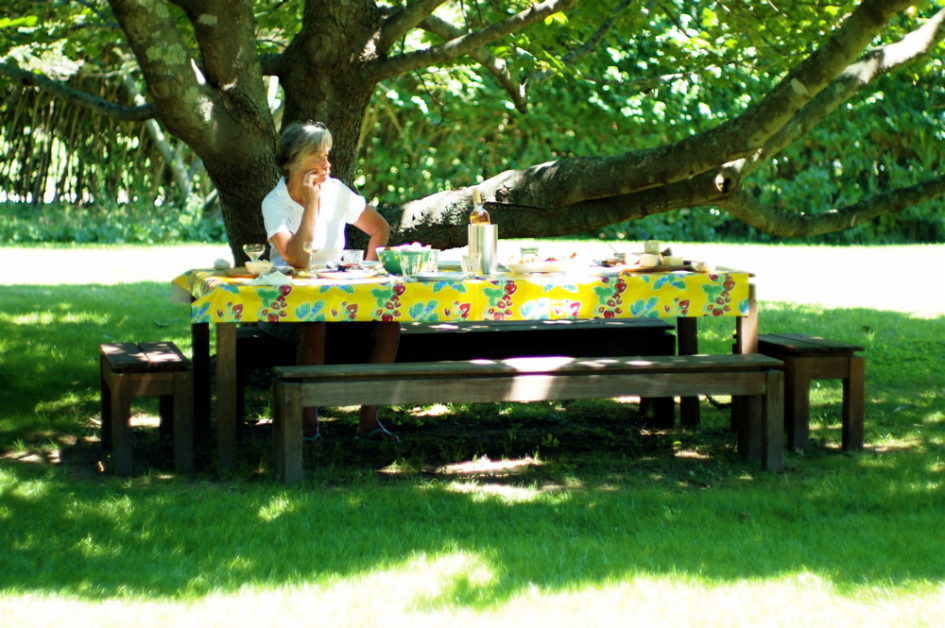
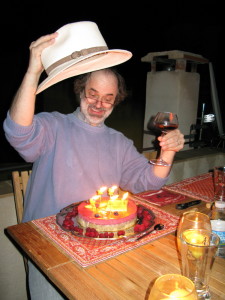 The point of eating is to slow down life long enough to promote what Brillat-Savarin called, with simple charm, good cheer. It doesn’t just take time, but makes time—carves out evenings, memories. That’s what Darwin meant when he said that we recall good dinners as happy days, wrapped like flies in a spider’s web by the silk of memory. (p.271)
The point of eating is to slow down life long enough to promote what Brillat-Savarin called, with simple charm, good cheer. It doesn’t just take time, but makes time—carves out evenings, memories. That’s what Darwin meant when he said that we recall good dinners as happy days, wrapped like flies in a spider’s web by the silk of memory. (p.271)Civilization is mostly the story of how seeds, meats, and ways to cook them travel from place to place. (p. 8)
That Provence could have contributed to the [inception of restaurants in Paris between 1780 and 1830], achieved by métissage, strange mixing, shows you how sedate a world the Palais restaurants were shaking up. That braised beef with poached vegetables, still the best of company dishes, should ever have been considered “à la mode,” much less exotic! (pp.27-28)
A modern meal is a drama unfolding between the Opening Drink and the Concluding Coffee, with the several acts passing between the libations. (p.31)
Brillat-Savarin’s ideal eater was not the gourmet—the fussbudget with a napkin—but the gourmand, the greedy guy with a date. “Gourmand,” though a word everyone knows, is a hard word to translate. Literally a glutton—but “glutton” in English has overtones of loutishness that the French word doesn’t have. To be gourmand is not just to be greedy for whatever it is they put in front of you but alive with appetite for the special thing you want. To be a gourmand is not to be a gourmet; you’re not finicky. But it is to want the good things in life. (pp. 40-41)
Home, Robert Frost wrote, is the place where, when you have to go there, they have to take you in. A restaurant is a place where, when you go there, they not only have to take you in but have to act as though they were glad to see you. In cities of strangers, this pretense can be very dear. (p. 53)
When we buy Thomas Keller’s French Laundry Cookbook—though I will admit that his short ribs are a steady thing—on the whole we grasp not only that you can’t do it, but that there is something gauche in even trying. (p. 59)
Taste begins at the door, and ends in our dreams. (p. 113)
Remarkably, nowhere in wine writing, including Parker’s, would a Martian learn that the first reason people drink wine is to get drunk. (p. 188)
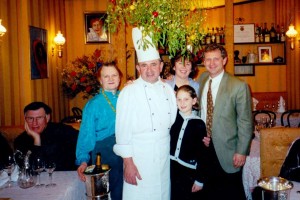 Yet though I would still rather eat in Paris than anywhere else in the world—eating, once again, is a social act before it is a purely sensory one; it calls on our moral taste more than our measuring tongue, and my own moral taste still leads me back inexorably to the wit and intelligence of French civilization—I recognize that the rebirth has not happened, that the crisis [in French food] I identified, only half-playfully, a decade or more ago is more entrenched now than it was then, and that fewer and fewer people who care about cooking now think of France as first among all others. (pp. 225-226)
Yet though I would still rather eat in Paris than anywhere else in the world—eating, once again, is a social act before it is a purely sensory one; it calls on our moral taste more than our measuring tongue, and my own moral taste still leads me back inexorably to the wit and intelligence of French civilization—I recognize that the rebirth has not happened, that the crisis [in French food] I identified, only half-playfully, a decade or more ago is more entrenched now than it was then, and that fewer and fewer people who care about cooking now think of France as first among all others. (pp. 225-226)The gods sat down to dinner twice a day, even though they would live forever if they never ate again. (p. 284)
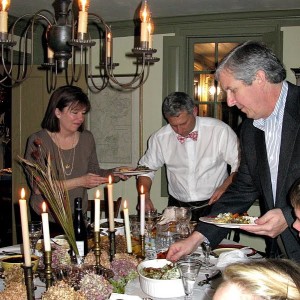 Cooking is the faith that raw ingredients can be conjured into a nightly miracle. (p. 285)
Cooking is the faith that raw ingredients can be conjured into a nightly miracle. (p. 285)
And we pray, too, that [our friends] will have finished cooking before we arrive, so that the horrible hour in the kitchen, as they fuss and mix, is one that we are spared. Even with a glass of wine in hand, it is hard to watch another cook—and when they have the food still in plastic wrap…it’s too much. (p. 85)
“I don’t understand how a young couple can begin life by buying a sofa or a television,” [British chef Fergus Henderson] said indignantly to me. “Don’t they know the table comes first?” (p. 8)






Wonderful post on a wonderful topic! We had New Year's Eve dinner with good friends in Carmel Valley. The majority of the evening was spent at the ding table, eating delicious food and discussing films, psychotherapy, travel, design, and New Year's resolutions. Truly an evening that will be wrapped in in the silk of memory.
Hi Kirsten,
That sounds like a dinner I would have loved! May your 2012 unfold as your 2011 ended, with more dinners with good friends…in Lourmarin, too! Thanks for your lovely note.
Best,
Susan
What a gr8 article! Makes me want to call all of my friends, go to the store, get plenty of food, and have a feast!!! Thanx 4 the memories. And the motivation. jcn
Susan and Towny,
Merci bien pour 'The Modern Trobadors.'
Et Bonne Année¡
-Henry
Je vous en prie, Henry!
What a wonderful review – I can't wait to read the book! After reading Gopnik's first book, I searched all over Paris – and on line – for a copy of that wonderful illustration of the train taking off – "Paris to the Moon." Never did find it.
Your pictures are lovely – thank you for sharing – and Bon Appetit for 2012!
I received Adam Gopnik's book as a Christmas gift. It was the perfect gift at the perfect time. As I cook Moroccan food for my own wedding, (yes, the Moroccan caterers in DC did not measure up), I understood, thanks to the book, why I am going to so much trouble. Food, prepared as a ritual for friends and family, is definitely in my makeup as an American woman raised in France. I can hardly wait for my guests to try my "poulet aux olives et au citron confit." I cooked Provencal dishes for Christmas and was amazed at the similarities with Moroccan food. There again, Gopnik is there with the connections. Read Gopnik and you too will discover from where these deep impulses originate. I wish I could invite him to the wedding.
Dear Wanda,
So good to hear from you….I, too, love that drawing. I went back to the book to refresh my memory of the illustration when I read your note. I love Gopnik's line about the drawing, certain that "If a train were going to run to the moon, that train would originate from the Gare du Nord, with Parisian kids getting worn out while they waited." Thanks so much for your thoughts!
Amitiés,
Susan
Hi Lisa,
You make us all want to attend your wedding and join your table with all that Moroccan food! The scents are wafting from my screen! A wedding that starts in the kitchen sounds like it is off to a grand start!
Amitiés,
Susan
I wonder if I might ask what restaurant you are in — I assume that is you pictured with the chef and a woman who I imagine is his wife. They look very familiar to me. Paris? A most enjoyable post and I shall look forward to reading the book. Thank you.
Thanks, Henry Waverly
After preparing, cooking, serving, eating, and clearing three meals per day for five days for 10 people over Christmas (3 adult children, their partners, and two teenagers belonging to the partner of one of the adult children – are you with me so far?) we decided a long New Year's Eve dinner was a step too far – so we had sausages and mashed potatoes, with onion gravy, accompanied by a bottle of Moet, in front of the fire in our house in Lourmarin. Unorthodox? Perhaps…..Enjoyable? You bet!
Cordialement
Jenny
Susan! Bonne Année! It is wonderful to read your post while sitting in our garden… seeing photos of us around the table with you, Towny and Alex, remembering those (and many other) wonderful meals we have shared, and thinking ahead to all the meals we have yet to share! Quelle joie!
As I have just begun reading Gopnik's book, I really appreciate "reading" it through you. The quotes you have chosen resonate deeply within me, and my favorite is the one about hosts not being ready when guests arrive. Mark and I are often SO ready – pots, pans and sink throughly cleaned – that guests think they have arrived on the wrong evening! Perhaps we should invite Adam (can I be so familiar?) to dinner when you visit later this month?!
Thanks, as ever, for your thoughtful and interesting posts. Wishing you, Towny and Alex a wonder-filled New Year! ~ David
PS – thanks for the Cocoa and Lavender plug!
Our family dinners were festive occasions. Our hard times were behind us and we had a comfortable lifestyle.
My dad had a job he dearly loved. He was a supplier to most of the wineries in northern California. Thus we had an adequate supply of wine around the house at all times.
Our dinners were always with wine and candlelight. No matter how meager or elaborate the meals may be, they were always served with candlelight and wine.
While dinners were not command performances, no one ever wanted to miss the ritual.
As a result, we grew up with the proper table manners and the proper attire and the importance of punctuality.
Thank you, Susan for helping us remember the good times. MMN
Susan, What a great article! Growing up, we spent most Sundays having dinnner at our house, my grandparents' house, or my aunt and uncle's house. I love having my grantparents' dining room set to remind me of those dinners. We always enjoy dinners at your house. The food, the conversation, etc. are all wonderful. We love being included. I always look forward to dinner with you, Towny and Alex.
Aughhh, Jenny! The table comes first is probably best balanced with the sentiment that likens house guests to fish…sausages, mashed potatoes and gravy with champagne around the fire in Lourmarin sounds divine! Gopnik would have had spicy rice and beans! Thanks for the funny story! best regards, Susan
David and Mark, So funny you should mention that particular quote because i thought of you two when i read it! Of course, we lie at the other end of the cotinuum and I shutter to think what Gopnik would think upon arrival at our house! I wonder where Adam, as you say, will be in late January….hmmm. My best regards, Susan
You are so right, MMN, the simplest meals can be the most appreciated and memorable. (See Jenny's sausage and mashed potato story above! ) It seems that those meals are very vivid memories for you–how lucky you are. I wish I could have dropped by your family dinners! My best regards, Susan
Ah, Ellen, thank you….likewise, we thoroughly and always enjoy our meals at your house–outside on your deck or around your grandparent's table. Mentioning the provenance of your table reminds me how much pleasure I get from using dishes passed on from my family and from my husband's and those that are gifts from friends. When i set the table, i think, for example, of my mother and father who gave me a set of china that was a wedding gift to them and now frequently graces our table. Thanks so much for your thoughtful comments. My best regards, Susan
Dear Henry, Thank you for your favorable comments. Regarding the name of the restaurant, I am embarassed to report that I cannot recall it and cannot–yet–find my notes. It is on the left bank. The night was New Year's Eve 2001. I will keep looking….now I want to know! Check back, please. My best, Susan
Last night my daughter and I enjoyed Midnight in Paris. We had wanted to see it for sometime, but after your suggestion, we quickly put it in our queue at Netflix. Now we are even more excited about our upcoming trip, if that's possible!
I'm not familiar with Adam Gopnik or his writings, but my daughter is. I will check it out! I love the photo of the adorable children around the dinner table. It reminds me of how we will be working on our p's and q's at the dinner table from now until we arrive in France!
Thanks again Susan! I have a new reason to enjoy Monday's with your blog.
A wonderful post! I'm sorry I missed seeing Adam Gopnik at the Music Hall but now inspired to buy his book. "Those were the days" when aunts, uncles and grandparents would gather at my parents' house for dinner, and I can still hear the stories and howls of laughter. And now, there's nothing I love more than squeezing friends around my table for good food, good conversation and merriment. Your photos reflect what must be very happy memories. – Doreen
As so many of your readers have written, hanging around the table, eating good food, drinking a little wine with those we really like…it doesn't get any better. I pity the people who are in too much of a hurry to stop and come to the table….they don't know what they are missing. Gerrry
What a beautiful feeling in this post (blog)- the lavish table and lots of friends and then seeing me in a couple of them! What a nice surprise. I also wish you three a wonderful 2012 and look forward to being together at the table soon. It was so nice to see Townie at Mary's concert.
Lots of love,
Eva
ps though I do read Adam Gopnik in the New Yorker, haven't read his books. You inspire me to at least rent it from the library!
Henry, you asked where the photo of us with the Chef was taken and it was at Chez Gramond (5 Rue Fleurus, 6eme Paris). The restaurant is a Paris institution and was, purportedly, a favorite hang-out of Mitterrand when he was still with us. The restaurant is very small (6 or 7 tables)and is entirely run, from kitchen to table, by a couple. The wife, Jeannine, manages the dining room while her husband, Jean-Claude, does all the cooking. I had his signature dish, civet de lièvre à la Française (a dark, deep rabbit stew prepared with red wine and finished with hare's blood) and for dessert we had his famous Grand Marnier soufflé. It was a memorable meal and evening. If you go to Paris, do seek it out…you won't be disappointed.
I, too, am half way through my (ahm, signed) copy that you sent to me for Christmas. I love it and don't want to finish. Like a good meal. Strange seeing myself in some of these photos as there are a few that I don't remember. I do, however, remember so many of our dining and cooking experiences AND experiments. There is no one with whom I have enjoyed the planning, preparing, and savoring of a meal more than with you. Too bad we don't have photographic evidence of me (strangely enough) at you engagement dinner! And thanks to your Grandfather, I will always think of an Old Fashioned as the perfect pre-dinner coctail. I'm glad that you included Gopnik's quote concerning loved ones missing from the table. I so frequently think of my father when food shopping or cooking or eating. And I'm just mad as hell that he's not here to enjoy the things he loved. And he was our sticky bun chef! …Thank you again for the wonderful read and this blog. Mille bisous. p.s. love the pic of Pierre!
Hi Eva,
Our meals around Mary's table that weekend were some of my most memorable…and indeed the occasion of a mutual friend turning 80 is worthy of many meals around the table! (We seemed to think so, at least!)
My best,
Susan
Thanks, Towny. I hope Henry checks back to read your reply. It was a great way to usher in 2002. I recall being especially warmly welcomed, being on the heels of September 2001. And, yes the soufflé alone would be worth a visit!
Amitiés,
Susan
Hi Doreen,
Do buy the book–it is a terrific read! It is a good thing we love to "squeeze friends around [the] table," as in these 18th century homes, we have little choice but to squeeze in, eh?!
Thanks for your comment and I will look forward to your next post on Cocoa and Lavender!
My best,
Susan
Dear Gerry,
My sentiments exactly! That seems to be a common theme in the comments as well as emails I have received: let's slow down and enjoy the food and the company around the table! Families who do so are healthier and I have a suspicion they are happier!
Thanks for your input!
My best,
Susan
Hi Sharon,
I am so glad you enjoyed Midnight in Paris! Watching it made me really want to go to France! I know you are going soon–I will send the names of some other movies you and your family may enjoy, as you get in the mood for Provence and Paris…and all that good food!! (Lucky you!)
Thank you for your comments!
Amitiés,
Susan
Dear Pam and D'Agneau,
How many times have we sat 'round the table over all these years…nearly 40?! (Years, that is…Lord know how many tables?)
I will always remember Thanksgiving with your parents and sisters and their families–I had never seen shrimps so large nor had so much fun playing board games–and I know your dad is indeed mad as hell!
Let's toast to food and those important people with whom we share it!
Bises,
Susan
Susan – I’m tempted to comment on “the table” post at last as so many, including my friends, have done, and I’d like to share with you my favorite meal from the whole of literature (as I know it). To Dickens then. David Copperfield is starting out in the world and has just moved in to his first apartment and, to celebrate the occasion, he invites to dinner his ex-landlord, the great-hearted Mr. Micawber and his wife, and his friend Traddles. The landlady is to provide the meal, but the evening starts badly.
“The leg of mutton came up very red within, and very pale without, besides having a foreign substance of a gritty nature sprinkled over it, as if it had had a fall into the ashes ……. “
Mr. Micawber suggests if David …..
“could produce a gridiron, I would put it to you that this little misfortune could be easily repaired. There was a gridiron in the pantry, on which my morning bacon was cooked. We had it in, in a twinkling, and immediately applied ourselves to carrying Mr. Micawber’s idea into effect. The division of labour …… was this: Traddles cut the mutton into slices, Mr. Micawber ….. covered them with pepper, mustard, salt, and cayenne, I put them on the gridiron, turned them with a fork, and took them off, under Mr. Micawber’s direction, and Mrs. Micawber heated, and continually stirred, some mushroom ketchup in a little saucepan. When we had slices enough done to begin upon, we fell-to, with our sleeves still tucked up at the wrists, more slices spluttering and blazing on the fire, and our attention divided between the mutton on our plates, and the mutton then preparing.
What with the novelty of this cookery, the excellence of it, the bustle of it, the frequent starting up to look after it, the frequent sitting down to dispose of it as the crisp slices came off the gridiron hot and hot, the being so busy, so flushed with the fire, so amused, and in the midst of such a tempting noise and savour, we reduced the leg of mutton to the bone ….. I am satisfied that Mr. and Mrs. Micawber could not have enjoyed the feast more, if they had sold a bed to provide it. Traddles laughed as heartily, almost the whole time, as he ate and worked. Indeed we all did, all at once, and I dare say there never was a greater success.”
These paragraphs are lodged in my mind. No matter the food. What matters? – the fun, the friendship, the sharing. In your house, Susan, as in mine, the table is a couple feet from the stovetop.
Brian
Cher Brian,
Even really crispy mutton could taste wonderful among friends. Let's not try it, but we know our conversations and laughter would be what counted.
My best,
Susan